As the Chelsea Flower Show celebrates its official Centenary with displays of plants from 1913 alongside exciting new plants and garden designs, we take a look at one of the horticultural families behind the show and how hard work didn’t always bring rewards.
The first Spring ‘Chelsea Flower Show’ was held at the Royal Hospital, Chelsea in May 1913. The site was originally suggested by Sir Harry Veitch, the third generation of the renowned horticultural family. It was first used for the Royal International Horticultural Exhibition as a one-off event in 1912. It proved such a good site for an exhibition that the ‘Great Spring Show’ moved there in 1913, where it has stayed ever since.
The Queen, who is patron of the Royal Horticultural Society, has attended almost every show since she came to the throne in 1953. The royal family have always taken an interest from its founding years as can be seen from the Illustrated London News item on the visit by Queen Alexandra.
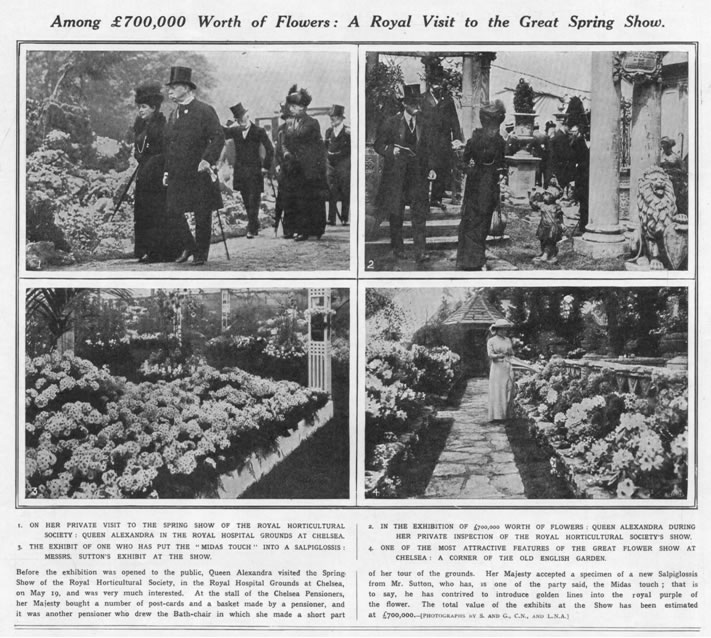
Sir Harry Veitch, the founder of the show, comes from one of the legendary ‘plant hunting’ families in Britain. With their ground breaking research and discovery of rare plants worldwide, the Veitch Family enthused many wealthy Victorians whilst at the same time provided careers and work for many people in horticulture.
Sir Harry Veitch was born in 1840 in St Thomas, Devon. Harry was the second son of James Veitch Jr and Harriott who married in 1838. He later worked with his father in their family horticultural business, James Veitch & Sons of Chelsea. He carried on the reputation of his family, winning many awards and he later became Treasurer of the Royal Horticultural Society.
The Veitch Family horticultural dynasty was originally founded by James Veitch Senior in Devon. He worked with his father on a large estate and then formed Veitch Nurseries. His son James Jr was the first of the skilled horticulturalists in the family. He expanded the business into Kings Road, Chelsea whilst his brother Robert managed the Exeter business. James Jr became a Member of the Council of the Royal Horticultural Society from 1856 to 1864 and such was his standing and reputation he formed the RHS Fruit & Floral Committees.

In demand at all the major events
Such was the reputation of the company, James Veitch & Sons provided the flowers for the lavish wedding breakfast of politician Sir Robert Peel in 1856, which was covered by the Illustrated London News (right).
James Veitch Jr’s formation of the RHS Fruit and Floral Committees, which is still in place today, reflected his interests in worldwide plants and introduced them to Britain. The Veitch Nurseries became specialists in ferns, orchids, tropical species and new, rare plants. To the left is the Veitch collection of Nepenthes, with specimens brought in from Australia, The Phillippines and Malaysia.
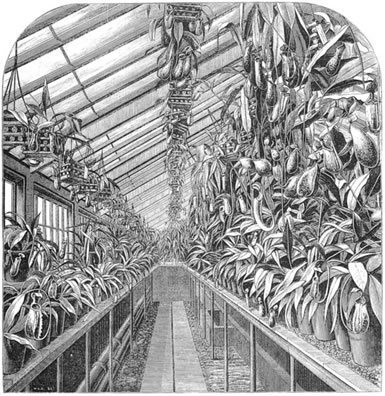
Continuing the horticultural skills through the generations
James’ enthusiams and skill as a horticulturalist was inherited by his sons who all became involved in the business. John Gould Veitch was the eldest and is classed as one of the first Victorian ‘plant hunters’ to visit Japan. He brought back many glasshouse plants that were fashionble at the time and has a plant from Fiji named after him.
Harry James was the second son and is recognised as guiding the firm through its most prosperous period. He worked with his younger brother Arthur as they continued to send ‘plant hunters’ all over the world to bring back those prized plant specimens.
Harry’s business ability and horticultural skill was required even more due to the early deaths of his brothers. John Gould Veitch died of tuberculosis aged only 31 in 1870 and Arthur was only 36 when he died in 1880. It was left to Harry to run things and he proved more than capable despite the expertise of his siblings no longer available to help him.
Flower Show Success
The exotic rare plant species brought Veitch Nurseries respect and awards. They are mentioned in the 1878 Illustrated London News winning a Banksian Gold Medal for their plant collections.
Access Over a Billion Records
Try a four-month Diamond subscription and we’ll apply a lifetime discount making it just £44.95 (standard price £64.95). You’ll gain access to all of our exclusive record collections and unique search tools (Along with Censuses, BMDs, Wills and more), providing you with the best resources online to discover your family history story.
We’ll also give you a free 12-month subscription to Discover Your Ancestors online magazine (worth £24.99), so you can read more great Family History research articles like this!
The firm enjoyed a number of successes at prestigious flower shows and events. We find mentions in the Illustrated London News in 1878 of a successful show for James Veitch and Sons at the RHS Show in South Kensington.
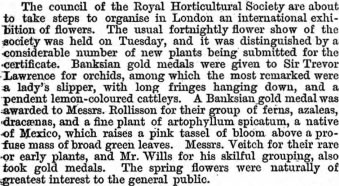

Harry’s success continued significantly. Here he appears on the 1881 census which shows how many people he employed at that stage.
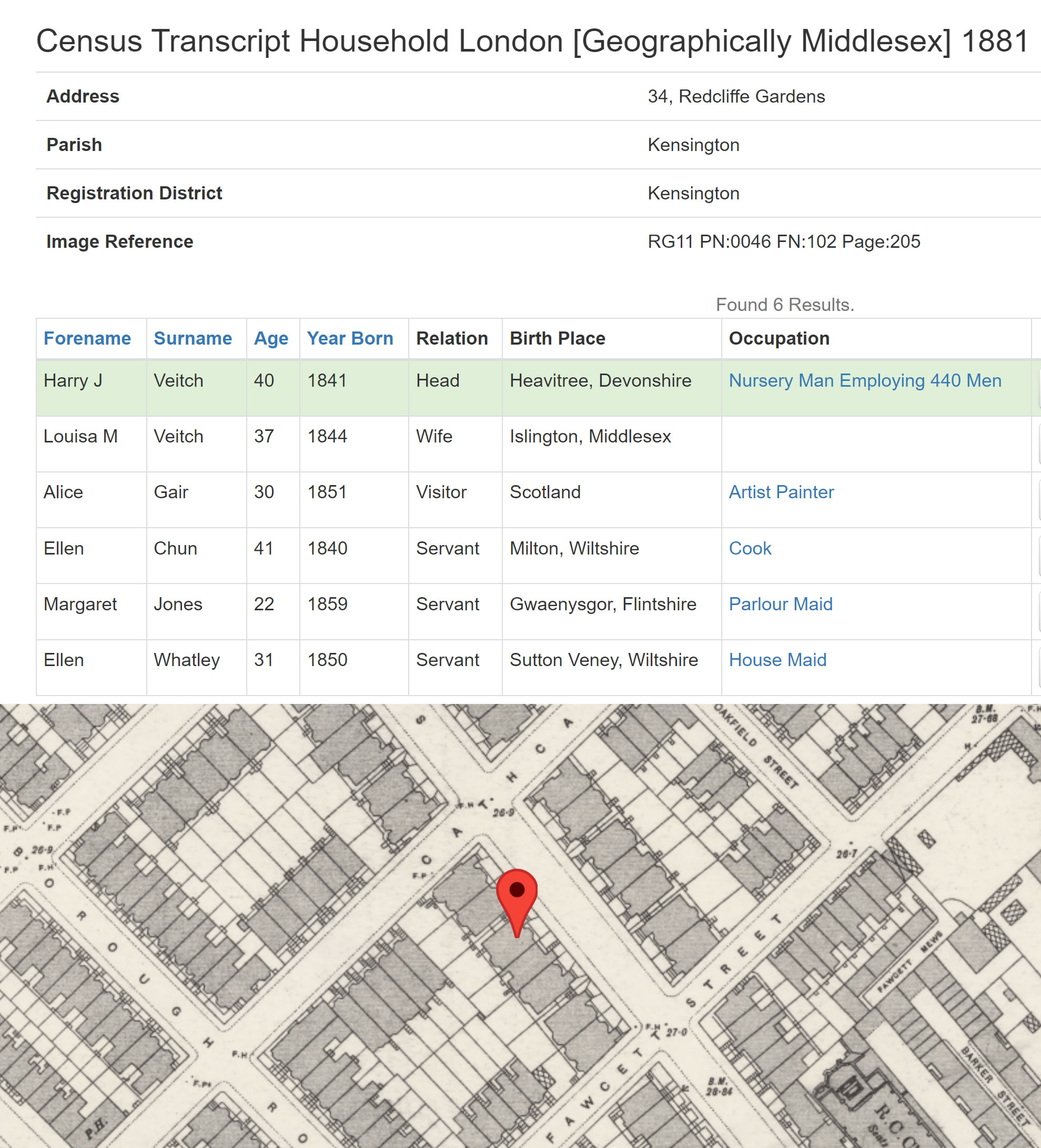
Reaching the peak of his profession
He became the first horticulturalist to be given a knighthood and also the ‘Victoria Medal of Honour’ in 1906, the highest award from The Royal Horticultural Society and a glowing tribute from his peers. He had retired from the family business by then, and he and his wife moved to Buckinghamshire in 1901.
Struggling to cope with the pressures of business
After he retired, Harry’s nephews took over management of the business. However, they lacked the business skills of Harry and found things very tough as the business started to struggle. The main nursery was still located on King’s Road as we can see from the advert in the Trades Directory of 1908.
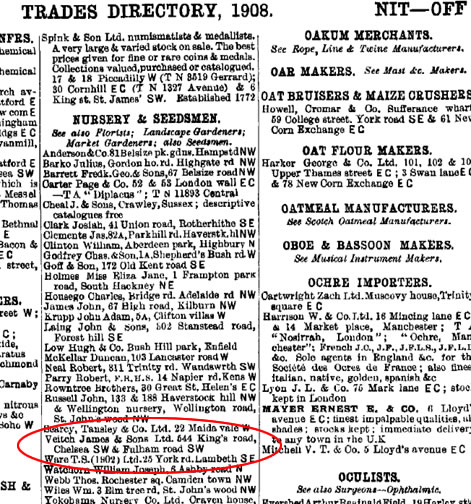
As was the case with their father, John Gould Sr, his two sons struggled with ill-health exacerbated by the pressures of running a high profile business. James Herbert Veitch had taken over as Managing Director but the pressures of the business proved too much for him and he suffered a nervous breakdown. He sadly died in 1907 aged only 39.
After his death, James’ brother John Gould Veitch took over the business. John was a former Cambridge graduate and England international footballer who scored a hat-trick on his one appearance, but his skills did not extend to business and horticulture and he could not improve the fortunes of the famous business. He too suffered from ill health, with weak lungs and premature deafness being two major ailments. He died in 1914 at the age of 45.
The Census of 1911 on TheGenealogist finds Harry Veitch back at the helm of the company at the age of 70 as a nurseryman and employer. His relatives had struggled to continue to manage the business and the pressures involved, Harry was recalled to rescue the situation.
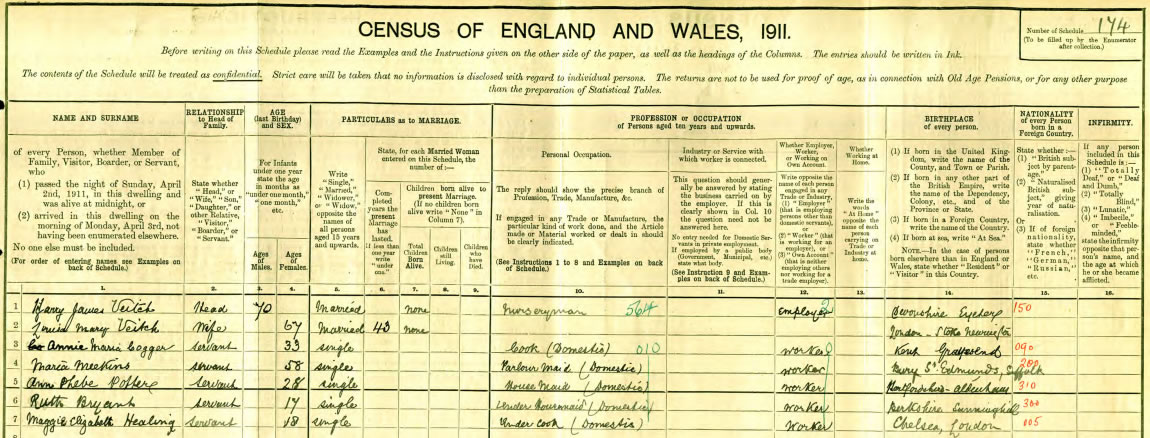
However, as we can see from the census record, Harry had no natural heir and with the death of his two nephews he decided to break up and sell off the business interests, ensuring the quality reputation he had built up over the years would not just fade away. The Royal Botanic Gardens at Kew acquired some of the rare trees and shrubs from his nursery.
Such was his enthusiasm and dedication to horticulture that he still found time whilst disposing of his business interests to suggest a new site for the RHS Flower Show, and help start off the Chelsea Flower Show. He also became Treasurer of the RHS in 1918 for one year, having been a member of its Council since 1887 and Chairman of the Orchid Committee for many years.
The passion and knowledge of the Veitch family is still remembered today with numerous plants named after the family and their discoveries. Having gone from managing the gardens on a large estate to running profitable ground-breaking nurseries, the family proved an inspiration to gardeners of the Victorian era.
Their lasting legacy of the Chelsea Flower Show and its appeal from Alan Titchmarsh, Vice President of the RHS, raised £1 million to help fund horticultural apprenticeships and encourage more young people to start gardening. This would surely have met with approval from the Veitch ‘plant hunters’.
Find out more about the occupations of your ancestors with on TheGenealogist.co.uk.






